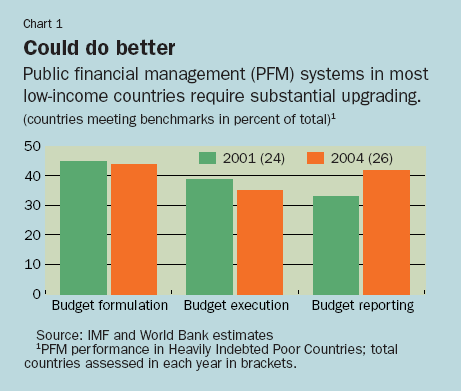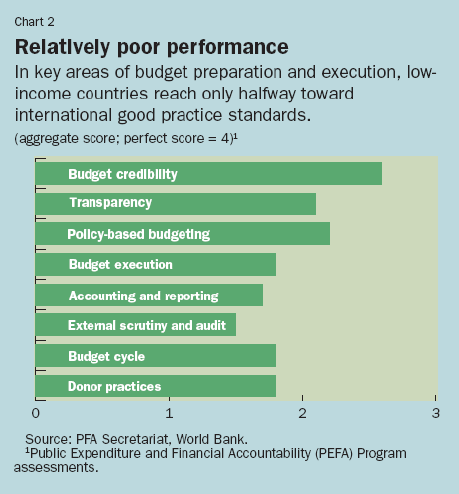
Typical street scene in Santa Ana, El Salvador. (Photo: iStock)
IMF Survey: Low-Income Countries Need Upgrades
July 19, 2007
- Financial management systems in most low-income countries need upgrading
- To deal with capacity constraints, upgrades best enacted in series of steps
- Initial focus on critical areas: budget classification, accounting systems
Sound fiscal institutions and public financial management (PFM) systems are essential if low-income countries are to benefit from scaled-up aid.

Katse Dam, Lesotho: public financial management reform should include more coverage of donor-funded projects in budgets (photo: Walter Dhladhla/AFP)
PUBLIC FINANCIAL MANAGEMENT
Weaknesses in PFM systems can undermine budgetary planning, execution, and reporting; reduce fiscal transparency; and result in leakage of scarce public resources. Low-income countries should prepare an action plan for strengthening their PFM systems. This article focuses on low-income countries that are expected to benefit from scaled-up aid and have specific PFM needs, though many of the recommendations also apply to other developing countries.
Weaknesses in existing PFM systems
Public financial management comprises the institutional framework, systems, and procedures that govern the preparation, execution, and reporting of the budget. PFM systems in most low-income countries require substantial upgrading, and in many cases have not improved significantly in recent years.
Assessments and action plans prepared jointly by the World Bank and the IMF for 23 heavily indebted poor countries in 2001 and for 26 in 2004 provided the first opportunity for periodic PFM assessments to measure progress over time. Nineteen of the 26 countries were assessed as still requiring substantial upgrading (see Chart 1). Budget execution and the ability of countries to track poverty-reducing expenditures were especially weak.

Assessments under the multi-partner Public Expenditure and Financial Accountability (PEFA) Program, in which the IMF participates, suggest a similar pattern of relatively poor performance in key areas of budget preparation and execution. Countries assessed in seven budget categories showed a median score of around 2.0 against the international good practice standard of 4.0 (see Chart 2).

Recent evaluations of the IMF's technical assistance activities in low-income countries reached a similar conclusion. One evaluation concluded that in many countries, budget plans were based on unrealistic assumptions, were not comprehensive, and lacked a medium-term focus; accounting and payments systems and other areas of budget execution were weak; budgetary institutions were fragmented; and broader institutional problems such as weak legislative oversight and poor accountability of senior budget officials were common. In some countries reviewed, civil conflict had added to these problems.
Countries that are emerging from conflicts or have suffered major disasters face special challenges in strengthening their fiscal institutions. These countries have generally received large injections of aid resources that their PFM systems are often not able to cope with, either because of the logistics of handling a sudden increase in inflows of aid, or because institutions and PFM capacities have been significantly weakened and cannot respond adequately or meet donor expectations.
In many postconflict or disaster-affected countries, there is often a sudden influx of foreign experts to work alongside national staff or sometimes even to run the central fiscal institutions until national staff can take over.
Key areas for PFM reform
A first critical area is to establish a coherent and well-integrated approach to strategic planning and budgeting. Reforms should include strengthening the relationship between the planning and budgeting cycles, strengthening the role of the cabinet in strategic decision making, integrating more closely the recurrent and development budgets, and increasing the coverage of donor-funded development projects in the budget. Strengthening these areas is of critical importance to the effective and efficient utilization of aid.
However, while these reforms are urgent and require an immediate start, they are also institutionally demanding—by requiring changes in the role of key players in the budget process—and can be politically sensitive, so change is likely to be slow, complex, and subject to resistance.
A second important area is to build capacity in budget execution and reporting to ensure the efficient, effective, and transparent use of public resources. Such reforms should initially focus on upgrading the classification of expenditures and revenues and the accounting, internal control, and fiscal reporting systems.
Budget execution
Still, on budget execution, frequently encountered problems such as spending arrears and weak control of expenditure commitments need to be contained. Special attention should be paid to tracking poverty-reducing public spending to ensure that it reaches the intended recipients.
Techniques such as the use of Public Expenditure Tracking Surveys (PETS) and audit reports can help identify persistent weaknesses in the expenditure chain. Public procurement and payroll management are other areas that are likely to require strengthening.
A third area of particular importance to countries benefiting from scaled-up aid is taking steps to more fully incorporate donor aid in the budget. According to a recent survey by the Organization for Economic Cooperation and Development, on average only 37 percent of external aid is channeled through country PFM systems. This complicates fiscal management.
A fourth area is to take initial steps to give the budget a results orientation. This would allow the governments to get a sense of whether scaled-up spending is having the desired effect on economic and social outcomes. However, advanced forms of results-oriented budgeting are not appropriate for low-capacity countries.
PFM action plans
Low-income countries should prepare an action plan for strengthening PFM systems based on a comprehensive diagnostic assessment. To deal with capacity constraints, it is often sensible to implement these plans in a series of steps. In the case of postconflict countries, the action plan may also need to address weak legal and regulatory frameworks (such as tax and budget laws), an ill-defined fiscal authority (the ministry of finance), and poorly developed PFM systems.
"Reforms of PFM systems are more effective if they are part of a broader public sector reform of the civil service, governance and transparency, and the legal framework"
The PFM action plans—which give priority to the most urgent reforms described above—should decompose reforms into key functional components such as the regulatory framework, business systems and operating procedures, information technology systems, and training and capacity-building needs. Monitoring progress in each area is essential so that problems can be addressed before they become obstacles to the overall reform process.
Critical needs
The action plan, which should be country specific, should also identify critical needs, measures that are more complex and require institutional/legal changes, and measures that are less urgent and can be addressed over the medium term. On content, in addition to the areas listed above, the action plan may also include, depending on country circumstances:
Developing capacity in debt management (in parallel to reforms in cash management and treasury systems) to help countries build their own medium-term debt strategy.
Strengthening the capacity of subnational governments: delivery of services such as education, health, and sanitation is increasingly being delegated to subnational governments, whose PFM systems are typically weaker than those of the national government.
Linking PFM reforms to broader public sector reforms: the reforms of PFM systems are more effective if they are part of a broader public sector reform of the civil service, governance and transparency, and the legal framework.
Gradually increasing the role and capacity of the national audit authority to provide an independent check on the integrity and reliability of the government's financial statements and the value-for-money of key expenditure programs.
Coordinating technical assistance
The IMF has an important role to play in helping countries design and implement PFM action plans in many areas that are part of its core mandate—for example, budget classification, accounting, internal control, and fiscal reporting. Such assistance should put emphasis on country ownership of the reforms; learn from lessons of the past to use technical assistance more effectively; where appropriate, make effective use of external finance and partnership arrangements with the World Bank and other assistance providers; and leverage the resources of staff from headquarters and the regional technical assistance centers that the Fund has established in Africa and elsewhere.
It has been estimated that globally more than 50 assistance providers work in the PFM area and, in any one country, the average number of providers is around seven. Given the IMF's limited resources and specialized expertise in core areas, coordinating with other donors is thus essential to avoid wasteful overlap and mixed messages.


